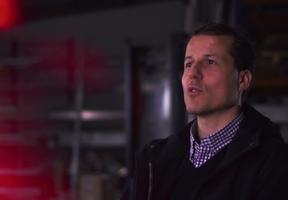Ocean Energy: 6 Careers with a Future
5 min read

© getty/subinpumsom
Ocean energy, derived from the force of water and wind or the conversion of marine , is a field where development is just getting started. A lot of techniques in the area are still in the experimental or prototype stage – which makes the related professions all the more exciting and promising.
By taking on one of these careers, you can help meet three important future challenges: the , protection of marine environments and the digital revolution. And they are just as open to women as they are to men.
A lot of the skills you’ll use in these jobs overlap with other professions, such as IT expert, electrician, mechanic and project manager. When applied to the underwater world, these areas of expertise take on a whole new dimension.
That’s not to say you’ll spend your whole career sailing the seven seas. You might take to the water occasionally, but most of the time you’ll be in other places, such as behind a computer, at a lab bench, in a control room or at the helm of heavy machinery.
There is a wide range of careers in ocean energy, divided into three categories:
Installation of facilities and connection to the grid: barge pilot, deck officer, engineer, drill operator, hoist operator, offshore crane operator, diver, docking pilot, undersea cable fitter, electrician, anchor flange fitter, logistics specialist.
Studies and tests: geomatician, oceanographer, marine biologist, wind turbine engineer, wind farm architect, data manager, project engineer.
Operations: operations manager, maintenance technician, support vessel captain (tugs and buoying vessels), helicopter pilot, diver, logistics specialist, stock manager.
Overview
- « Port Careers » : Logistics Specialist, Docking Pilot, Crane Operator...
- Offshore Wind Turbine Maintenance Technician
- Hydropower Engineer
- Geomatician – Cartographer
- Oceanographer
- Marine Biology Engineer/Researcher
« Port Careers » : Logistics Specialist, Docking Pilot, Crane Operator...

Responsibilities:
Port workers act as a link between land and sea by receiving, packaging and loading heavy equipment headed to marine
generation facilities (offshore wind turbines, tidal turbines, etc.). At the port, women and men with a wide range of complementary skills work together, from docking pilots (docking/undocking ships) to crane operators, hoist operators and steel construction workers. The equipment they handle can be quite unusual, such as “heavy packages”, which might contain a 400-metric-ton wind turbine nacelle or a 2,000-metric-ton floater, or jack-up rigs that are attached to the ocean floor using vertical cylinders and fitted with cranes capable of lifting 4,000 metric tons.
Requirements:
Good physical strength, ability to react quickly to unforeseen events, team spirit.
Education:
- After finishing middle school, a two-year vocational qualification in machinery operation or logistics operation.
- Vocational high school diploma in goods transportation organization.
- Technical certificate in transportation and related logistics management.
- Associate degree in logistics and transportation management.
- Professional bachelor’s degree in international logistics and transportation.
Salary:
Specialists in operating a complex tool are fairly well paid. An entry-level crane operator can expect a gross monthly salary of around €2,000/€2,200. An experienced crane operator can earn between €2,700/€2,800 per month, plus bonuses.
Learn more (links in French):
Offshore Wind Turbine Maintenance Technician

Responsibilities:
These technicians are responsible for starting up and performing mechanical verifications on offshore wind turbines before delivery, as well as maintenance operations (upkeep, repairs, parts replacement, etc.). They are versatile, with knowledge of electrical and mechanical systems, hydropower and more. They also have skills related to the marine environment, particularly in terms of safety, such as firefighting, survival at sea, first aid, and radio and VHF communications. Maintenance operations also involve other specialists, such as divers, ship captains and helicopter pilots. Around 100 technicians are required for a large offshore farm.
Requirements:
Well-rounded knowledge in various technical fields, highly rigorous working methods, a strong sense of self-discipline and good organizational skills.
Education:
- Technical certificate in electronics or systems maintenance.
- Associate degree in industrial engineering and maintenance.
Salary:
Starting salary of minimum wage plus bonuses. Pay rises rapidly with experience.
Learn more (link in French):
Fiche métier CIDJ - Technicien(ne) de maintenance éolienne
Hydropower Engineer

Responsibilities:
As specialists in fluid mechanics, hydropower engineers are involved in the management of hydropower plants,
plants and marine power generation systems. They also work on water treatment, drinking water supply and irrigation projects. They divide their time between the field and engineering offices, and may be required to travel abroad.
Requirements:
A scientific mind combined with an interest for work in the field and a knack for organization and planning.
Education:
Five years of higher education in engineering, specializing in hydropower.
Salary:
Gross starting salary of between €2,500 and €3,000.
Learn more (links in French):
Geomatician – Cartographer

Responsibilities:
This job is at the intersection of geography and IT. Geomaticians are essentially cartographers for the digital age. They use data from observations in the field, statistical databases and satellites. Satellites are increasingly used to calculate sea levels, surface temperatures, cloud altitudes and atmospheric composition – all information that can prove useful for the installation of offshore energy generation equipment. The data is collected, shared and analyzed. Geomaticians may also work on “suitability maps” setting the various economic activities in an offshore area.
Requirements:
An interest in geography, IT and mathematics; the ability to think outside the box; skills in data management and web mapping.
Education:
- Two-year technical certificate in geometry/topography and digital modeling.
- Professional bachelor’s degree in cartography, topography and geographical information systems.
- Five years of higher education with a Master’s degree in geomatics or engineering.
Learn more (links in French):
Oceanographer

Responsibilities:
Oceanographers are highly trained and extremely versatile scientists working at the crossroads of biology, geology, meteorology and physics. Oceanographers specializing in ocean energy projects study the seabeds to which equipment will be anchored, the speed and direction of currents, wind force and wave height, pollution at sea and on the coast, and the effects of energy facilities on marine fauna. Their work includes periods spent at sea (often limited to one month per year) and a lot of time in the office and lab (for example, analyzing plans and mathematical models).
Requirements:
Wide-ranging curiosity for all life and earth sciences; great flexibility to alternate between theoretical studies and practical work in the field.
Education:
- A three- or five-year degree. Knowledge of English and excellent IT skills are essential.
- Oceanography degrees are delivered by universities and some engineering schools, such as ENSTA in Paris. In addition, it is often possible to become an oceanographer after studying more general courses in other subjects such as digital technology, biology and geology. Military training may be available for positions at the French Naval Hydrographic and Oceanographic Service (SHOM).
Salary:
Gross starting monthly salary of €2,500 for an engineer in a public institution.
Learn more (links in French):
- Fiche métier ONISEP - Océanologue
- Fiche métier CIDJ - Océanographe
- Fiche Emploi Environnement - Océanographe
Marine Biology Engineer/Researcher

Responsibilities:
These engineers and researchers study marine biology in the broad sense, from to microbiology, chemistry, the conversion of marine biomass (particularly microalgae) into useful molecules and innovative biofuels, the of materials by seawater (biofouling) and carbon capture in the ocean. Positions for marine biology engineers and researchers in engineering firms are highly varied and include those of expert, consultant, project manager and industrial project coordinator.
Requirements:
An interest in theoretical work, lab research, teamwork and international collaboration; a good level of scientific English.
Education:
- Five years of higher education.
- Bachelor’s degree in life sciences, then a specialized Master’s degree.
- Engineering school.
Salary:
Gross starting salary of between €2,500 and €3,000, which can vary greatly between the private and public sector.











